How Many US Muslims Deny Hamas’ Crimes on Oct. 7?
Tyler O'Neil /
FIRST ON THE DAILY SIGNAL—One year after Hamas terrorists in Gaza invaded Israel, raping women and slaughtering more than 1,100 people, including infants, and after video evidence of the slaughter has spread across the world, a shocking percentage of American Muslims deny these facts and harbor disgusting antisemitic attitudes, a new poll shows.
When asked which statement “comes closest to your view,” more American Muslims selected “Hamas did not commit murder and rape in Israel on October 7” than “Hamas committed murder and rape in Israel on October 7.”
More than a third (39%) denied the Hamas murders and rapes, while only 31% admitted them. Another 30% said they “don’t know,” in the poll, provided first to The Daily Signal.
Female Muslims and Muslims of Arab descent proved more likely to say Hamas did not commit murder or rape on Oct. 7.
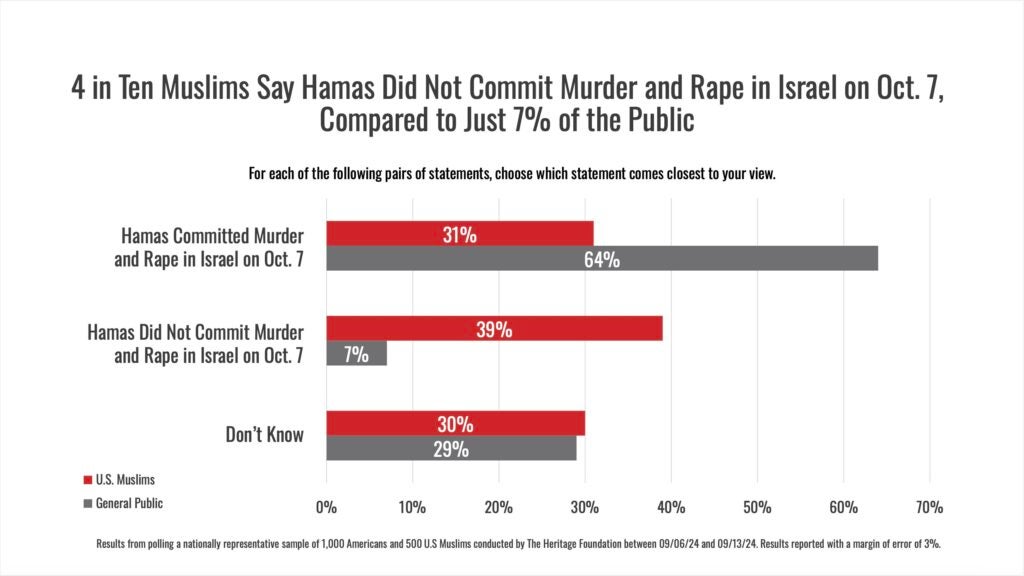
Among the general American public, 64% acknowledged the crimes of Hamas, while only 7% denied them, and another 29% said they did not know.
When asked why Hamas attacked Israel on Oct. 7, 59% of Muslims selected, “because Hamas wanted to forward the Palestinian cause,” while only 14% explained the terrorism by saying that “Hamas wanted to kill Jews and is set on the destruction of Israel.” By contrast, most Americans (51%) explained Oct. 7 by noting that Hamas wanted to kill Jews and destroy Israel, and only 17% said Hamas aimed at forwarding the Palestinian cause.
Two-in-three college graduate Muslims (67%) said Hamas attacked in order to further the Palestinian cause. Black Muslims (39%) proved the least likely to give that explanation.
Similarly, many American Muslims (43%) said, “Israel does not have a right to exist as a Jewish homeland,” while only 11% of the general public said so. One-third of American Muslims (33%) said “Israel has a right to exist as a Jewish homeland,” compared with two-thirds of overall Americans (66%).
Younger Muslims (ages 18 to 29) and Muslims of Arab descent proved more likely to say Israel has no right to exist as a Jewish homeland.
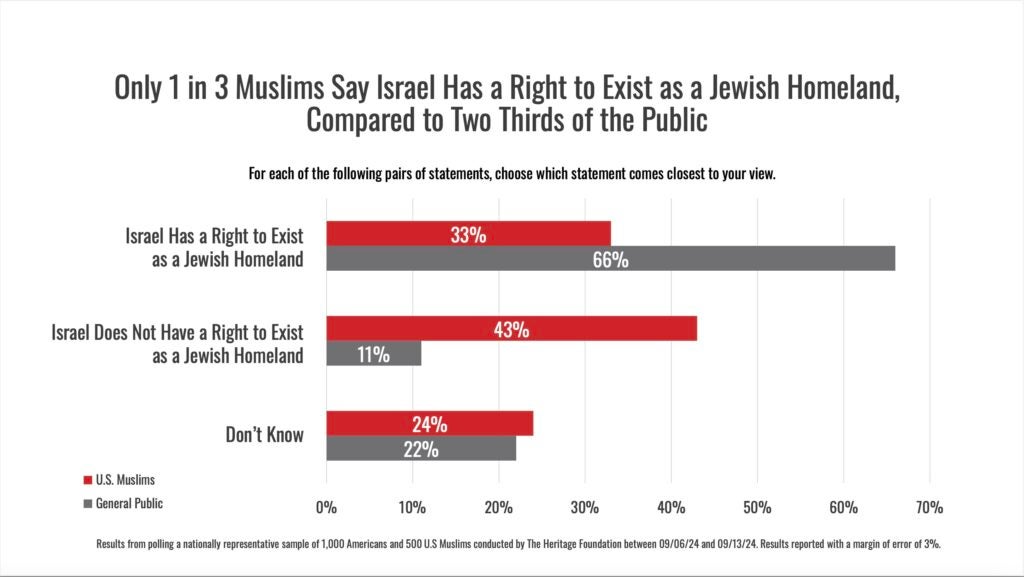
Antisemitic Beliefs
The survey also asked U.S. Muslims whether “Jewish people have too much power, too little power, or about a normal amount of power” in American media and in U.S. federal policy.
A majority of Muslims (58%) said Jews have “too much power” over the media, and about the same number (57%) said Jews have “too much power” over federal policy.
My contrast, far fewer among the general public say Jews have “too much power” over the media (22%) and policy (17%), while more Americans say they have “about a normal amount of power” over the media (41%) and policy (45%).
Older Muslims (67% of those older than 65) and college graduate Muslims (64%) proved more likely to say Jews have too much power over the media.
Meanwhile, more Americans (57%) say antisemitism has increased in the wake of Oct. 7 than say anti-Muslim animus has increased (44%) during the same period. One-third of Americans say anti-Muslim animus has decreased in that time, while only 20% say antisemitism has decreased since then.
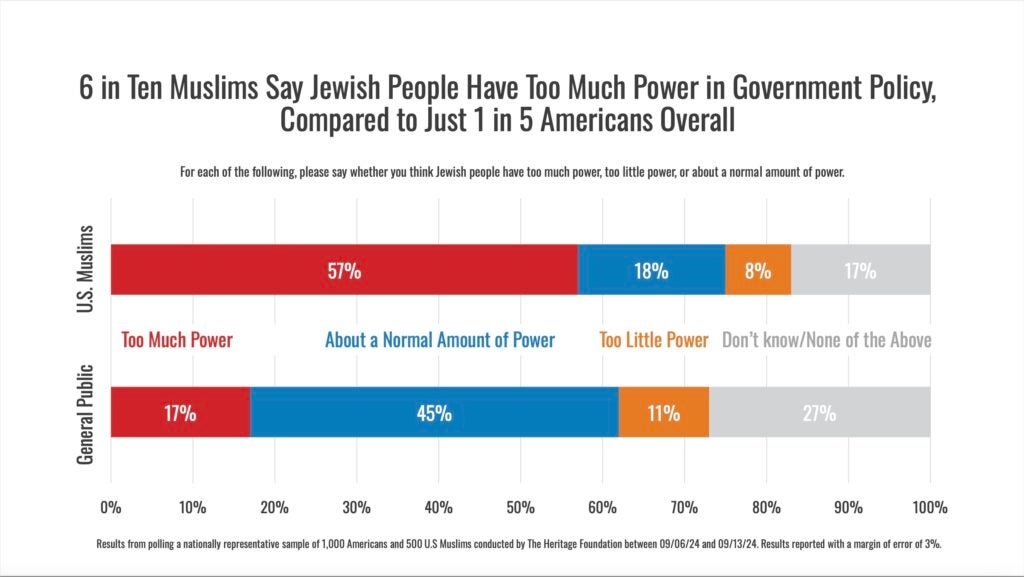
If Attacked By Iran
The survey—conducted in September, before Iran sent rockets into Israel on Tuesday—asked both Muslims and the broader population what the U.S. should do if Iran were to attack Israel.
About a bit more than a third of U.S. Muslims (37%) said the U.S. “should not support Israel at all,” while a quarter (25%) said the U.S. should “support diplomatically only.” A smaller group said the U.S. should “support Israel with aid and military equipment, but not send troops” (14%), and only 9% said the U.S. should back Israel with American troops.
By contrast, Americans overwhelmingly support Israel, with 17% saying the U.S. should send troops, 35% backing Israel with military equipment and aid short of troops, and 20% saying the U.S. should provide only diplomatic support. Only 8% said the U.S. should not support Israel at all.
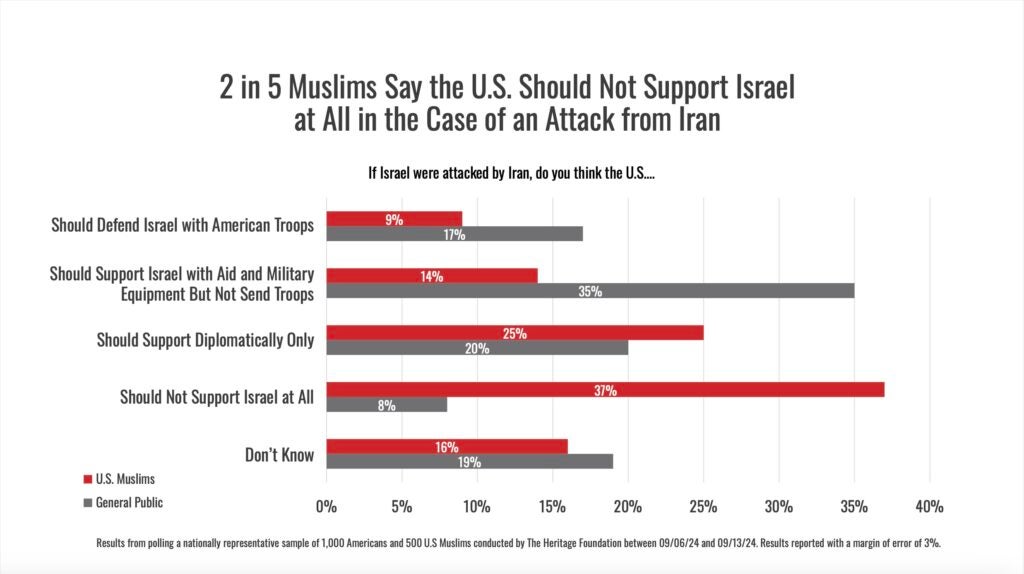
The 2024 Election, Kamala Harris
U.S. Muslims rank the Israel-Palestine conflict highly when deciding how to vote in the 2024 election.
The survey asked: “Of the following options, what is most important to you in the next election?” Among the general public, only 4% selected “the Israel-Palestine conflict,” which took a back seat to inflation and the economy (29%), immigration (25%), threats to democracy (9%), and abortion (9%). Even climate change ranked higher at 5%.
Meanwhile, 34% of Muslim respondents selected the Israel conflict as their top issue, while only 25% chose the economy and 11% selected immigration.
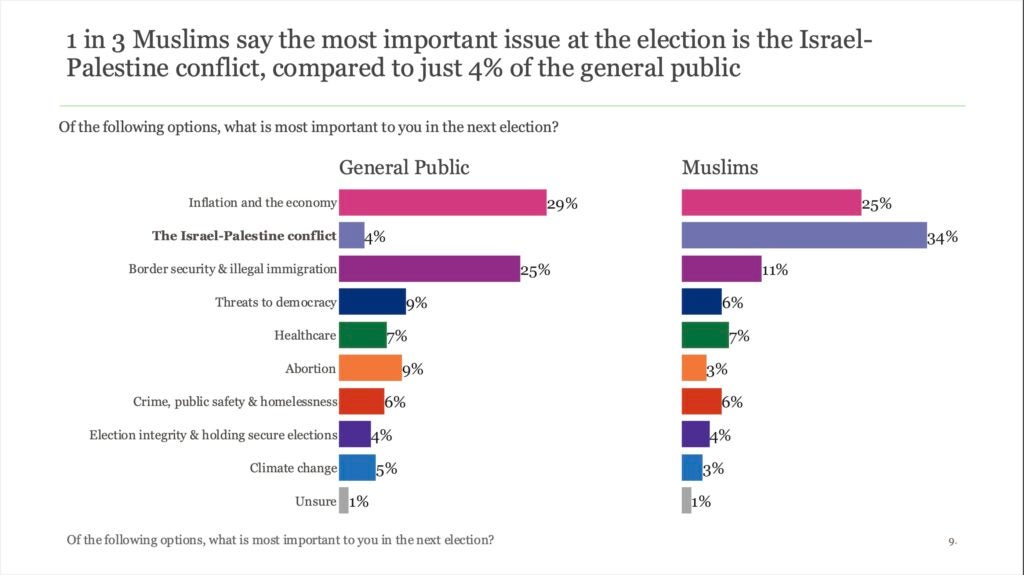
The survey also probed American Muslims’ attitudes toward the Democratic presidential nominee, Vice President Kamala Harris. Almost half (47%) said Harris is “too pro-Israel,” while 29% said she “gets the balance about right,” and 7% called her “too pro-Palestine.”
College graduate Muslims (53%), and Muslims of Asian (62%) and Arab (66%) descent proved more likely to call Harris “too pro-Israel,” while Muslims of other races—black (37%), white (41%), and Hispanic (52%)—proved more likely to say she gets the issue right.
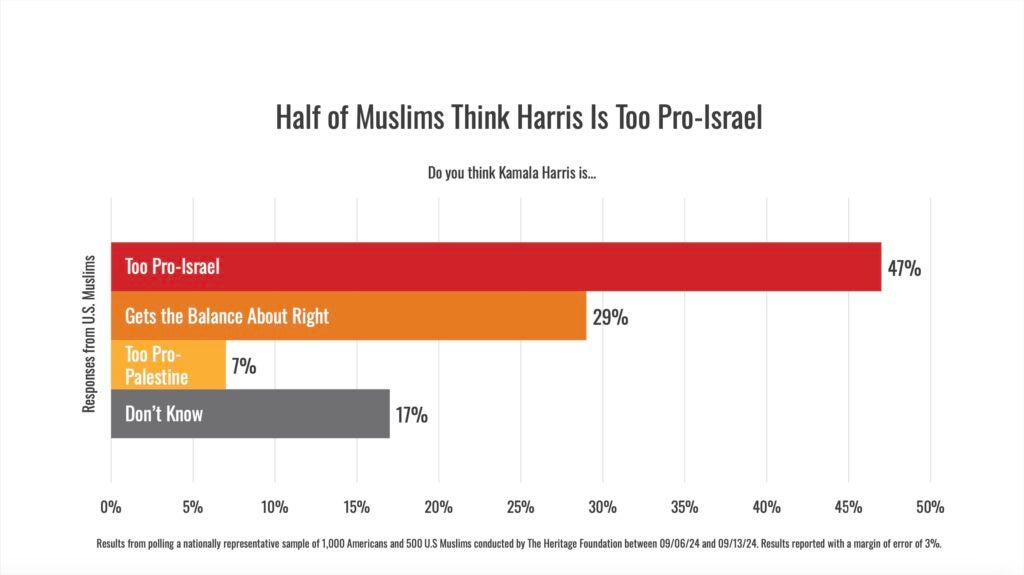
Muslim Identity Politics
The survey asked American Muslims and the general public about various policy positions that would give Islam a favored place in American society and law. On each issue, American Muslims proved more supportive than the American public at large.
Muslims proved more likely to support making it illegal to show a picture or cartoon of the Prophet Muhammad (50%) than the general public (14%). They proved more likely to support the formation of a Muslim political party (46%) than the general public (9%). They backed the implementation of Sharia law (39%) more than the general public (10%). They also supported declaring Islam America’s national religion (33%) more than the general public (9%).
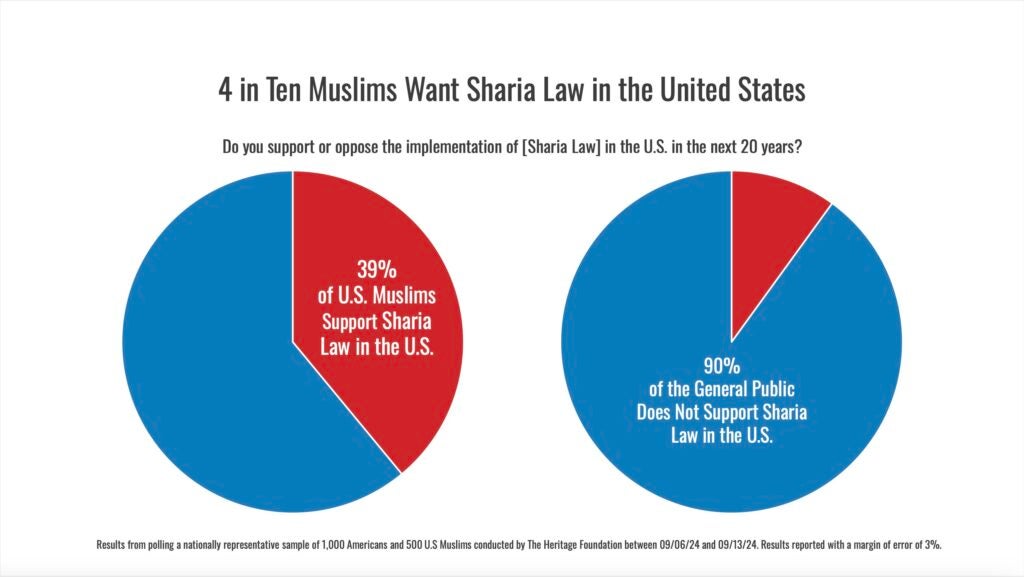
Many Muslims opposed these policies (31% opposed implementing Sharia law and 32% opposed declaring Islam the national religion), but the general public opposed them far more vigorously (56% and 68%, respectively).
“Sharia” merely means “law” in Arabic, and interpretations of Sharia vary. While radical Islamist groups such as the Taliban interpret Sharia in extremely restrictive ways, American Muslims vary widely.
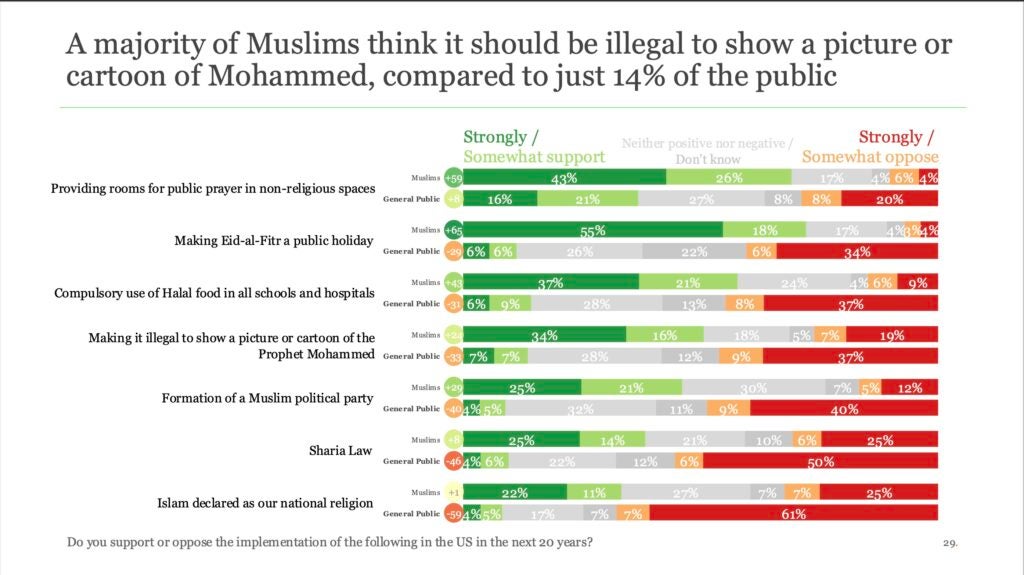
Muslims Oppose Attacking Jews on College Campuses
While American Muslims proved more likely to oppose Israel’s right to exist, to deny Hamas committed murder and rape, and to ascribe positive motives to Oct. 7, they did not support campus protesters targeting Jewish students who support Israel.
The survey asked which of two statements comes closest to respondents’ views: “Jewish students on college campuses who openly support Israel are not valid targets of campus protests” or they “are valid targets.”
Nearly half of Muslims (46%) agreed with nearly half of the general public (48%) that these Jewish students do not represent valid targets.
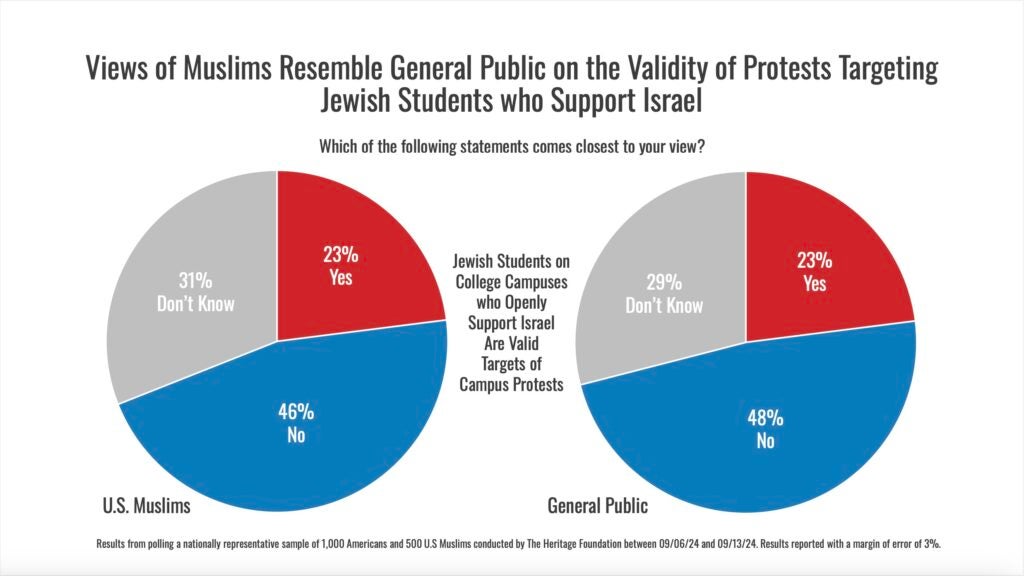
Only 23% of Muslims and 23% of the general public described the students as valid targets, while the rest said they do not know.
The survey, conducted by J.L. Partners on behalf of The Heritage Foundation, polled 1,000 Americans online between Sept. 9 and Sept. 13 to determine attitudes among the general public. The study surveyed 500 U.S. Muslims through various methods—landlines, cellphones, text messages, and online panel. Analysts weighted the survey to obtain a representative sample. The margin of error is plus/minus 3%.
